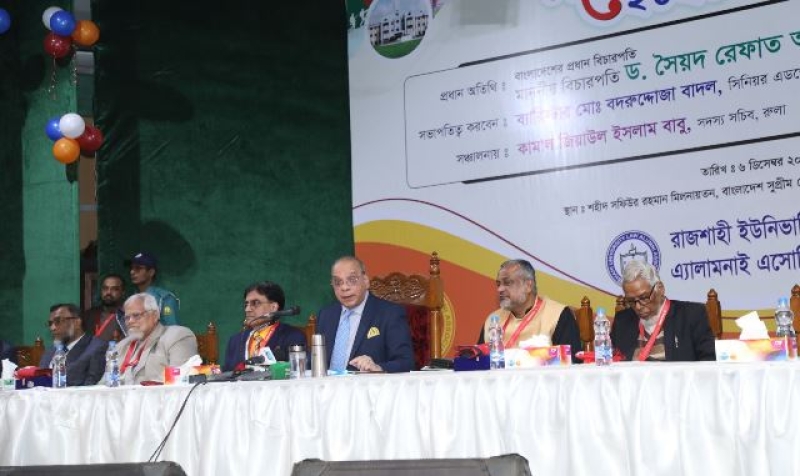- Sea of Mourners Gathers to Pay Tribute to Khaleda Zia |
- State mourning begins, state funeral for Khaleda Zia at 2 pm |
- Kamal Hossain: Khaleda Zia was ‘a patriot and democratic guardian' |
- High medicine prices threaten healthcare of poor communities |
Chief Justice calls for justice as a universal right

Chief Justice Syed Refaar Ahmed speaking at the Rajshahi University Law Alumni Association (RULAA) Council held at the Shaheed Shafiur Rahman Auditorium of the Supreme Court Bar Association.UNB
Dhaka, Dec 6 - Chief Justice Syed Refaat Ahmed on Friday urged legal professionals to stay committed to ensuring justice as a universal right in society.
“Whether in the courtroom, the classroom, or the community, let us remain committed to building a society where justice is not a privilege but a universal right,” he said.
The Chief Justice made this call while addressing the Rajshahi University Law Alumni Association (RULAA) Council held at the Shaheed Shafiur Rahman Auditorium of the Supreme Court Bar Association.
“Together, we have the power to transform challenges into opportunities and to pave the way for a future defined by equity and integrity,” he said.
Pointing at the alumni, he said they carry the responsibility of upholding the ideals of justice, equality, and human rights. He said that their work as legal professionals, educators, and advocates plays a pivotal role in shaping a society rooted in fairness and the rule of law.
“It is imperative that we continue to use our knowledge, influence, and resources to champion the causes of the marginalized, strengthen the legal framework, and promote access to justice for all,” he said.
Pointing at the Supreme Court lawyers, the Chief Justice said they also act as bridges between the judiciary and the people as their role extends beyond the courtroom.
“You educate citizens about their rights and responsibilities, empowering them to engage with the legal system. Your work ensures that the law is not an abstract concept but a living promise of fairness and equality for all,” said the Chief Justice.
Refaat Ahmed said when he took the oath as the 25th Chief Justice of Bangladesh, he was acutely aware of the immense responsibility placed upon his shoulders. “This role is not merely a position of leadership, but a solemn trust bestowed by the people of this nation to uphold fairness, equity, and ensure access to justice for all, irrespective of their status or circumstances,” he said.
From the very moment of his appointment, he recognized the urgency of addressing the challenges that have long impeded the full realization of our judiciary’s potential, he added.
“To this end, on September 21, I unveiled a comprehensive roadmap for judicial reform. This initiative is a cornerstone of my vision to strengthen our judiciary and its capacity to serve the people with integrity and efficiency,” said the Chief Justice.
As part of his steadfast commitment to institutional reform and strengthening the independence of the judiciary, he has taken decisive steps to establish the foundations for true separation of powers, said Refaat Ahmed.
“I have declared and initiated the process of creating a separate Secretariat for the Judiciary, a pivotal measure to ensure the judiciary's administrative autonomy,” he said.
Alongside this, he has proposed the formation of a Judicial Appointment Council to institutionalize transparency and meritocracy in the appointment process of apex court judges, as well as Posting and Transfer Guidelines for District Judiciaries, aimed at fostering consistency and fairness in judicial postings.
“These proposals have been formally submitted to the government for necessary action, marking a significant step toward the complete institutional separation of the judiciary from the executive branch,” he said.
Moreover, in reinforcing the judiciary's independence from the legislative branch, they have restored and strengthened the Supreme Judicial Council following the disposal of the 16th Amendment review case, he went on.
Recognizing the critical importance of access to justice, he introduced a Capacity Test alongside the existing Means Test for invoking legal aid services, said the Chief Justice.
RULAA convenor Barrister Bodruddoza Badal presided over the function moderated by its member secretary Kamal Ziaul Islam Babu. - UNB

